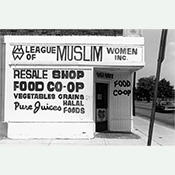 Halal ("permitted" in Arabic) refers to Islamic dietary restrictions. Along with proscribing what not to eat (haram or “forbidden” in Arabic), halal requires minimal suffering and the pronouncement of the name of God during the slaughter of an animal. Though halal food items and restaurants were limited early on, today they have become a staple on the American culinary map. The variety of halal ethnic cuisines reflects the diversity of the American Muslim community.
Halal ("permitted" in Arabic) refers to Islamic dietary restrictions. Along with proscribing what not to eat (haram or “forbidden” in Arabic), halal requires minimal suffering and the pronouncement of the name of God during the slaughter of an animal. Though halal food items and restaurants were limited early on, today they have become a staple on the American culinary map. The variety of halal ethnic cuisines reflects the diversity of the American Muslim community.
View Full Album
Halal means “permitted” in Arabic; it is the opposite of haram, or “forbidden.” These are key concepts in Islam with many ramifications for the daily life of a Muslim; one of the most visible expressions of these concepts may be found in Islamic dietary rules. Among those Qur’anic injunctions related to the consumption of food is the following:
O believers, eat of the good things We have provided for you and be grateful to God, if it is Him that you worship. He has only forbidden you carrion, blood, pig’s meat, and animals over which any name other than God’s has been invoked. But if anyone is forced to eat such things by hunger, rather than desire or excess, he commits no sin: God is most merciful and forgiving. (Qur’an 2:172-173, trans. Abdel Haleem)
Accordingly, food items considered haram include pork and beasts of prey; further, the consumption of intoxicants such as alcohol is also haram. Islam prescribes a method by which animals may be slaughtered with minimal suffering. At the time of slaughter, the name of God is pronounced, symbolizing God’s role as creator and provider: such meat is considered halal.
Contemporary Muslim understandings of halal food rules do vary. Some Muslims believe that avoiding pork, pork lard, and alcohol and saying “bismillah” before eating are sufficient for food to be halal. Other Muslims insist on Islamically slaughtered meat and carefully check all product labels for haram ingredients. Other Muslims contend that these proscriptions are not limited to food, and will not wear perfume if it contains alcohol, opting instead for oud or oil-based options, or use soaps made from lard. In the American context, these proscriptions may at times be difficult to observe, as some products contain pork by-products or small amounts of alcohol such as in desserts and cakes.
Another verse of the Qur’an allows for consumption of the slaughtered meat of both Jews and Christians (“People of the Book”):
“Today all good things have been made lawful for you. The food [slaughtered meat] of the People of the Book is lawful for you as your food is lawful for them” (Qur’an 5:5, trans. Abdel Haleem)
Based on this, when halal options are limited, some American Muslims opt to eat kosher food, which is marked with a “K” on the packaging. Jewish dietary rules also forbid the consumption of pork and require that the name of God be said at the time of slaughter. Muslim travelers sometimes request kosher meals for their airplane flights; at Harvard University, some Muslim undergraduates take their meals at Hillel House, the Jewish student center.
Early on, there was an increasing impetus in the Muslim community to educate the larger community about Islamic dietary restrictions and to establish halal groceries and restaurants, as well as to create a halal certification system that would function in a way similar to that used for kosher foods. One such certification effort that resulted is IFANCA, the Islamic Food and Nutrition Council of America, a national organization that certifies over 2,000 brands of food that qualify as halal, serving both the Muslim consumer and companies seeking an entry into this particular market.
Today, in larger U.S. cities with significant Muslim populations, there is a growing network of halal products available, with groceries, catering services, and restaurants offering halal food. Databases are maintained on websites and apps like “Zabiha” and “haloodie”. These apps allow consumers to search for halal products and restaurants by state and zip codes, in addition to posting reviews about their food and halal status. Sameer’s Eats is a popular halal restaurant review show which launched the “Halal Food Tour” in five major cities across the U.S in 2013. This was instrumental in establishing halal food on the American culinary map. Many universities across the U.S. also now offer halal food as an option in student dining facilities. Due to the growth in popularity of halal foods, mainstream grocery chains like Whole Foods, Giant, and Walmart stock halal frozen foods and meats by brands such as Saffron Road or Crescent Foods.